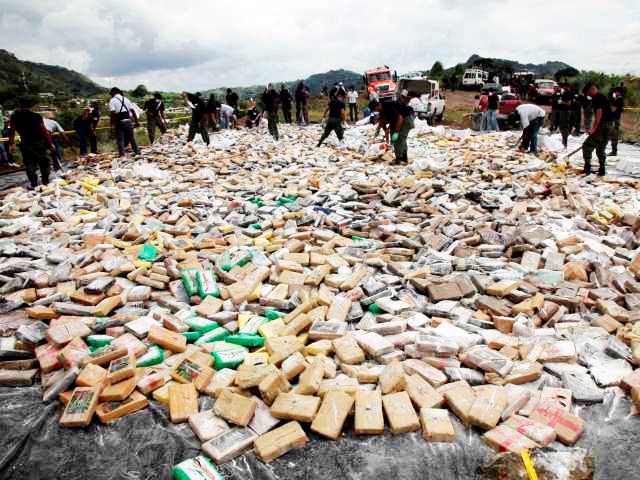It has long been known that Colombian terrorists produce roughly half of the cocaine that enters Mexico en route to the US. Panamanian authorities have recently revealed that the Sinaloa Cartel has had a direct presence in Panama for years—including most-wanted kingpin Joaquin “El Chapo” Guzmán himself.
Prior to this revelation, this cocaine would normally make its way through typical drug trafficking channels in Central America north to Mexico.
The new findings come as a result of an 18-month long investigation—coordinated with Mexican authorities—during which Panamanian authorities confiscated about four tons of cocaine, more than $500,000 in cash, five speed boats, and 38 vehicles. More than 50 people were arrested and processed in Panama, according to UPI news service. Because El Chapo Guzmán was allegedly in Panama seven years ago while on the run, Panamanian officials started to believe a cocaine connection existed and that his organization was operating in-country.
The case sprang out of inquiries regarding a Mexican couple working for the Sinaloa cartel while living in Panama City. Authorities in Panama said the couple established a drug trafficking business relationship with Martín Leonel Pérez Castro, known as Richard—leader of the Revolutionary Armed Forces of Colombia (FARC) Front 30 unit who was arrested in 2014. The FARC was borne out of the Colombian civil war and emerged as a Marxist-Leninist revolutionary group in the 1960s. It started resorting to terrorist tactics like bombings and kidnappings, and was eventually designated as a terrorist organization by the US government.
According to UPI, Pérez Castro allegedly controlled about 60 percent of the FARC’s drug trade to buy weapons and other materials for the rebel group’s insurgency campaign. Front 30 operates in Colombia’s southwestern Valle del Cauca province, which has access to the Pacific Ocean, making it easier to traffic drugs to Central America and Mexico.
The FARC’s size and activities have diminished significantly in Colombia in the last several years, due in no small part to cooperation between the US and Colombian governments via Plan Colombia. The Colombian government and the FARC have been trying to reach a peace deal for years, with a deadline agreed upon in September. However, despite the decrease in terrorist attacks and the impending deal, cocaine production in Colombia has not diminished.
The Sinaloa Federation has probably the widest geographic reach of all the Mexican cartels, and its presence in places like Guatemala, Nicaragua, and Honduras is well documented. However, its reach into Panama is significant because of the FARC’s historic presence there—particularly in the notoriously lawless Darien region. In July 2013, former Panamanian President Ricardo Martinelli told AFP news service, “When I assumed the presidency in 2009, 25 percent of the Darien Gap was controlled by the FARC. Today I can say that Panama has total sovereignty over 100 percent of its territory.” InSightCrime.org assessed that this claim was implausible due to the region’s remoteness and difficulty in patrolling its jungle terrain. The first cocaine processing facility in Central America was actually discovered in the Darien in 2013, and likely belonged to the FARC.
Historically, the Sinaloa cartel hasn’t been alone in Panama. According to intelligence reports cited by the newspaper La Prensa in September 2013, the Gulf cartel, the Beltran Leyva Organization, Los Zetas, and the Juárez Cartel were the drug trafficking organizations most readily identified as being present in Panama in previous years. A local intelligence report in late 2012, seen by La Prensa, said:
“A group of Mexican hitmen were in Panama, then Mexican agents lost track them in Paso Canoas.” According to this information, suspected Sinaloa cartel assassins “were looking for several members of the opposing Los Zetas cartel operating in Central America, including Panama.” According to the report, this group of gunmen had several “jobs” in Guatemala, Costa Rica, Colombia, and Honduras.
Panama is working to extradite the unidentified Mexican couple accused of helping expand Guzman’s cocaine trafficking network.
Sylvia Longmire is a border security expert and Contributing Editor for Breitbart Texas. You can read more about cross-border issues in her latest book, Border Insecurity: Why Big Money, Fences, and Drones Aren’t Making Us Safer.

COMMENTS
Please let us know if you're having issues with commenting.